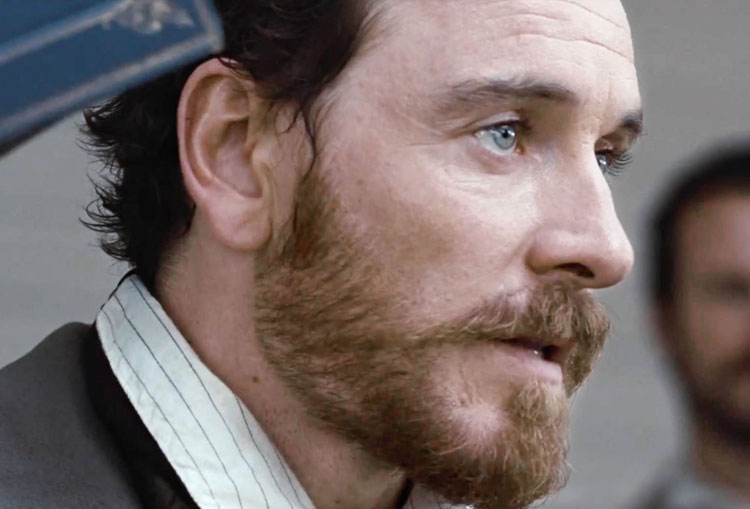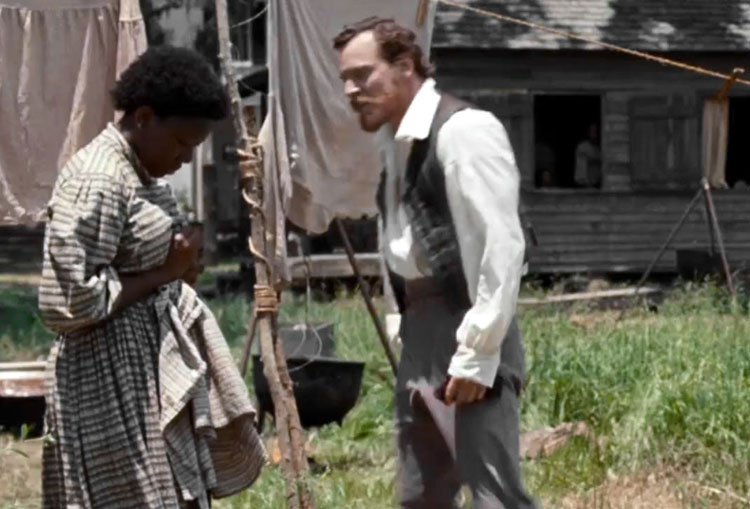
|

|

|

|

|

|

|

|

|

|

|


Had Steve McQueen not already christened his previous picture thus, "Shame" would have been the perfect one-word title to capture the gut-wrenching impact of his third and most essential feature, "12 Years a Slave." Based on the true story of free black American Solomon Northrup’s kidnapping and imposed bondage from 1841 to 1853, this epic account of an unbreakable soul makes even Scarlett O'Hara's struggles seem petty by comparison. But will audiences have the stomach for a film that rubs their faces in injustice? As performed by Chiwetel Ejiofor, Northrup's astounding story is too compelling not to connect with American audiences, and important enough to do decent business abroad as well.
The first thing fans of McQueen's "Hunger" and "Shame" will notice here is the degree to which the helmer's austere formal technique has evolved — to the extent that one would almost swear he'd snuck off and made three or four films in the interim. Composition, sound design and story all cut together beautifully, and yet, there's no question that "12 Years a Slave" remains an art film, especially as the provocative director forces audiences to confront concepts and scenes that could conceivably transform their worldview.
If "Django Unchained" opened the door, then "12 Years a Slave" goes barreling through it, tackling its subject with utmost seriousness. The film opens in a world where slavery is a fact of life and Northrup has no recourse to challenge his captivity. Duped and drugged on a bogus job interview, he awakens in shackles and is beaten ferociously when he dares to assert his status as a free man. Some may wonder why he doesn't continue to protest, forgetting that the word of a black man in pre-Civil War America had almost no legal currency, especially if said individual was unable to produce his free papers.
Assuming Northrup wants to survive, a fellow hostage advises, he must do and say as little as possible, in addition to hiding his ability to read and write. "I don't want to survive," Northrup bellows. "I want to live!" Separated from his wife and children, he faces a situation where the entire society is stacked against him. While not every white person in the film is evil, they willingly participate in a system that demeans their fellow man, and the injustice is too great simply to forget and move on (as Hollywood and society would evidently prefer).
Alarmingly, the few films of the past century to engage directly with the institution of slavery have nearly all come from the exploitation sphere, fetishizing aspects of violence and sexual abuse that McQueen endeavors to cast in a different light. An early scene in which slave trader Theophilus Freeman (Paul Giamatti) prods naked slaves for the benefit of prospective buyers offers an alarming yet in-no-way-arousing corrective to an equivalent sequence in the tasteless 1971 mock-doc "Goodbye Uncle Tom," which lingers on the nudity and degradation of such a market. There's little ambiguity in these unflattering depictions, though neither is there opportunity for audiences to misconstrue them as erotic.
To simplify Northrup's memoir, John Ridley's script lets the character — stripped even of his identity as he is redubbed Platt Hamilton en route to market — change hands just three times over the course of the film. Two of those owners, played by Benedict Cumberbatch and Bryan Batt, are as decent as the circumstances permit, even going so far as to encourage the fiddle playing with which he previously earned his living in upstate New York. The third, Edwin Epps (Michael Fassbender), becomes the bane of Northrup's existence — a man who justifies his actions according to scripture and prides himself in "breaking" disobedient slaves.

On Epps' plantation, "Platt" is expected to pick 200 pounds of cotton each day and is savagely beaten every time he falls short. For sheer productivity, none of the slaves comes close to Patsey (Lupita Nyong'o), a soft-spoken beauty of whom Epps is especially fond, much to the consternation of his severe wife (Sarah Paulson). This jealous big-house matriarch is a familiar character among such exploitation movies as "Mandingo," constantly jealous that her husband prefers the favors of a slave, and yet Paulson dodges the caricature, even when throwing a heavy crystal decanter in Patsey's face or urging her husband to beat the life out of her.
Such cruelty is commonplace in the film’s first two hours, and though audiences might not pick up on the technique, McQueen applies the same unflinching approach to these moments that he used in "Hunger" and "Shame": long uninterrupted takes that force us to absorb the full impact of human mistreatment, as when Northrup survives a lynching attempt, only to dangle from a noose for several minutes while his fellow slaves move about in the background, too nervous to cut him down. This scene also perfectly illustrates McQueen's knack for letting the characters' behavior inform the sociology of the situation, rather than explaining things overtly through dialogue.
Though arguably too harsh for young eyes, "12 Years a Slave" will serve as an important teaching tool, giving audiences who've never witnessed the dynamics of slavery an impression of how the system worked. As in Northrup's near-hanging, we see that even though slaves far outnumbered their white masters, harsh discipline could serve to discourage organization by playing upon their survival instincts. Few scenes this year could be more depressing than Patsey begging Northrup to end her suffering, unless you count the one in which Epps forces him to beat her nearly to death — an exchange heightened by the way McQueen constructs the sequence within a single 10-minute shot, as the agitated camera circles her abuse.
Actors like Nyong'o don't come along often, and she's a stunning discovery amidst an ensemble that carves out room for proven talents such as Paul Dano, Alfre Woodard and Brad Pitt to shine. Though the film brims with memorable characters, the show ultimately belongs to Ejiofor, who upholds the character's dignity throughout. McQueen shrewdly limits everything audiences see and feel to the sphere of Northrup's direct experience, drawing us into his head and keeping us there by including occasional shots in which this hyper-intelligent individual (in many ways the superior of his captors) struggles to make sense of his station.
When it comes time to bestow awards, voters tend to prefer characters who suffer to those who abuse, and yet, this actorly transformation may be Fassbender's most courageous yet, tapping into a place of righteous superiority that reminds just how scary such racism can be.

In many respects, "12 Years a Slave" works like a horror movie, beginning with a "Saw"-style abduction and proceeding through subsequent circles of hell, the tension amplified by a score that blends chain-gang clanging with those same foghorn blasts Hans Zimmer used in "Inception." As captured by cinematographer Sean Bobbitt, however, a rare beauty suffuses even the most infernal situations.
This radiant aesthetic, coupled with the rousing use of spiritual songs, provide a beacon of optimism amidst so much hate, once again proving cinema's place as the ultimate human-rights medium. It's a shame that such injustice was allowed to exist for so long — 12 years for Northrup and nearly 250 for those less fortunate — and an even bigger disgrace that it takes a British director to stare the issue in its face.
